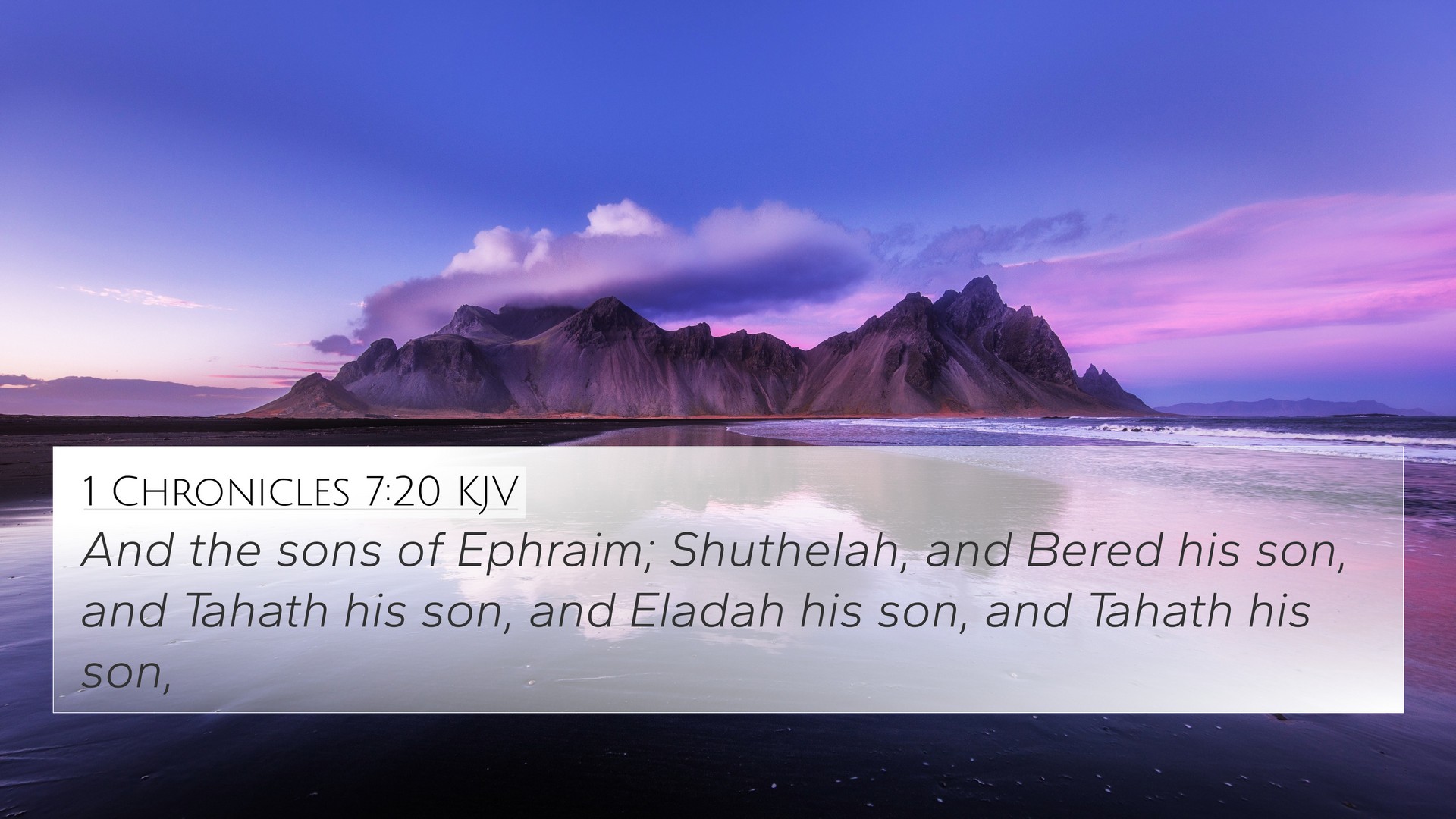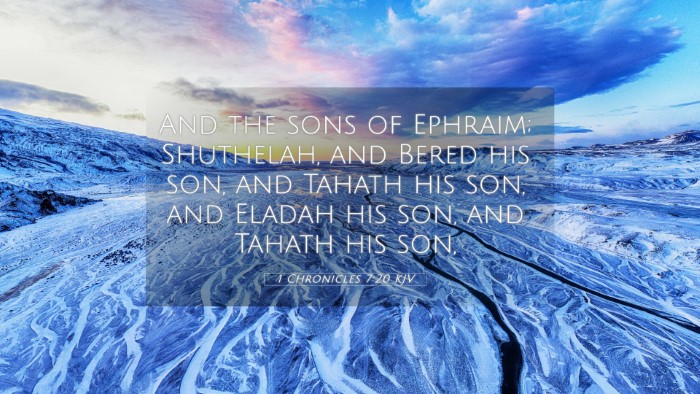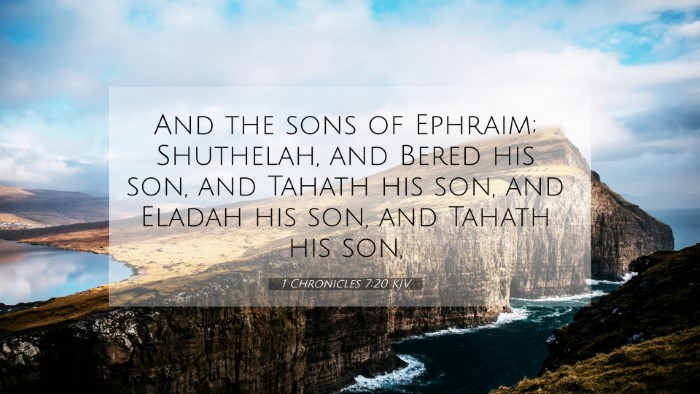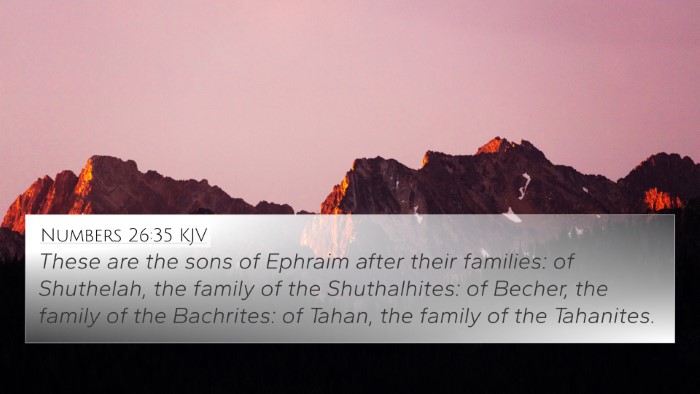Understanding 1 Chronicles 7:20
Verse: 1 Chronicles 7:20 states: "And the sons of Ephraim: Shuthelah, and Bered his son, and Tahath his son, and Eladah his son, and Tahath his son." This verse provides a genealogical record of Ephraim's descendants, highlighting the importance of family lineage in the Hebrew culture.
Significance of Genealogy
The genealogies in the Bible serve several significant purposes:
- Historical Context: These passages help to establish the history and heritage of the Israelite tribes, affirming their legitimacy and continuity.
- Messianic Lineage: Many genealogies trace the ancestry of Jesus Christ, connecting Him to the promises made to the patriarchs. This aids in understanding Biblical prophecy and fulfillment.
- Cultural Identity: For the Israelites, their genealogy affirmed their identity as God's chosen people and provided a sense of belonging within the community.
Commentary Insights
Insights from notable public domain commentaries highlight the depth of the genealogy presented in 1 Chronicles 7:20:
- Matthew Henry: He emphasizes the importance of tracing the lineage as part of God's faithfulness to His people. The mention of Ephraim's sons shows how God ensures that each family is recognized and remembered in His divine plan.
- Albert Barnes: Barnes points out that these genealogies serve to reassure the Israelites of their heritage during the post-exilic period, where the identities had become mixed. The verse underlines specific family ties and the idea of inheritance, both spiritual and physical.
- Adam Clarke: Clarke elaborates on the significance of individual names, suggesting that each one might represent distinct traits or leadership roles within the tribe of Ephraim, reflecting the multifaceted nature of God's dealings with Israel.
Cross-References to 1 Chronicles 7:20
Understanding 1 Chronicles 7:20 can be enhanced through cross-referencing with other related scriptures. Here are some relevant connections:
- Genesis 48:1-22: Jacob blesses Ephraim and Manasseh, establishing their significance as tribes.
- Exodus 1:1-5: The names of the sons of Jacob, providing context to the lineage of Ephraim.
- Joshua 16:5-10: Describes the inheritance of Ephraim and the allotment of land.
- 1 Chronicles 5:24: Discusses the genealogy and roles of the descendants of Joseph.
- Matthew 1:2-16: The genealogy of Jesus, which includes a mention of Ephraim's lineage.
- Luke 3:23-38: Traces Jesus’ genealogy through Joseph, providing further connections to Old Testament families.
- Jeremiah 31:9: Contains a prophetic mention of Ephraim, highlighting its ongoing significance in God's plans.
Thematic Connections
Exploring 1 Chronicles 7:20 through thematic Bible verse connections reveals greater insights:
- Inheritance: The notion of inheritance is prevalent throughout Scripture, seen in passages such as Romans 8:17, where believers are called heirs with Christ.
- Faithfulness of God: In verses like Hebrews 10:23, God's faithfulness in keeping His promises is central, as well as noted in the preservation of genealogies.
- Covenant Identity: The identity established through ancestry is echoed in 1 Peter 2:9, referring to believers as a chosen generation.
Applying Cross-Referencing Tools
To delve deeper into the connections between Bible verses, consider utilizing various tools:
- Bible Concordance: A resource that lists words used in the Bible and where they are found, aiding in locating cross-references.
- Bible Cross-Reference Guide: Books or study aids dedicated to revealing related verses and themes.
- Bible Chain References: A system of following verses that lead to related scriptures, offering a structured way to study the Bible.
- Cross-Referencing Bible Study Methods: Utilizing thematic studies or sequential reading approaches to draw parallels and links between different scriptures.
Conclusion
In summary, 1 Chronicles 7:20 presents a vital genealogical note that emphasizes the significance of family heritage within the broader narrative of Scripture. By using cross-referencing tools and engaging with related verses, believers can uncover deeper insights and understand the connections woven throughout the Bible. This approach not only enhances personal study but also serves as a foundational component in preparing sermons or teaching sessions focused on the continuity of God's promises through generations.



